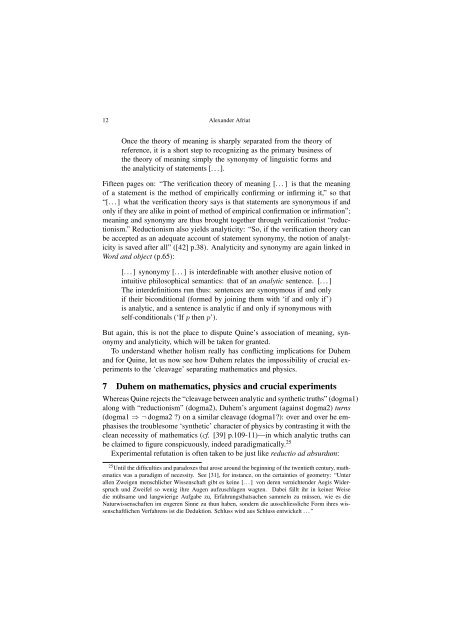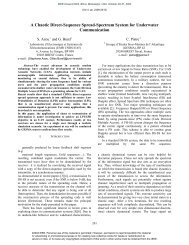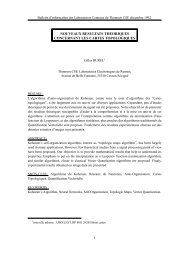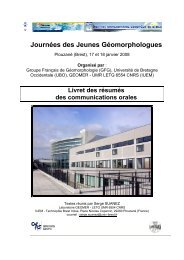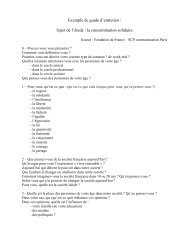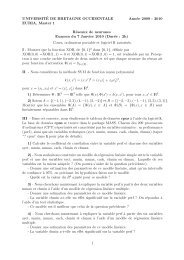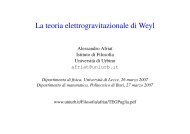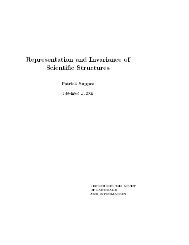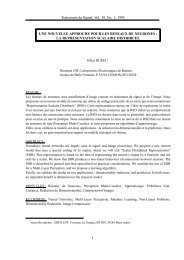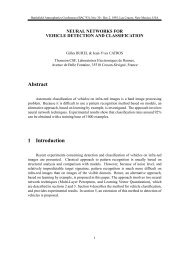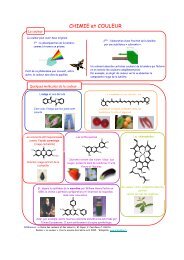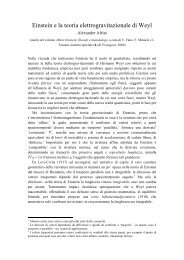Duhem, Quine and the other dogma
Duhem, Quine and the other dogma
Duhem, Quine and the other dogma
- No tags were found...
You also want an ePaper? Increase the reach of your titles
YUMPU automatically turns print PDFs into web optimized ePapers that Google loves.
12 Alex<strong>and</strong>er Afriat<br />
Once <strong>the</strong> <strong>the</strong>ory of meaning is sharply separated from <strong>the</strong> <strong>the</strong>ory of<br />
reference, it is a short step to recognizing as <strong>the</strong> primary business of<br />
<strong>the</strong> <strong>the</strong>ory of meaning simply <strong>the</strong> synonymy of linguistic forms <strong>and</strong><br />
<strong>the</strong> analyticity of statements [. . . ].<br />
Fifteen pages on: “The verification <strong>the</strong>ory of meaning [. . . ] is that <strong>the</strong> meaning<br />
of a statement is <strong>the</strong> method of empirically confirming or infirming it,” so that<br />
“[. . . ] what <strong>the</strong> verification <strong>the</strong>ory says is that statements are synonymous if <strong>and</strong><br />
only if <strong>the</strong>y are alike in point of method of empirical confirmation or infirmation”;<br />
meaning <strong>and</strong> synonymy are thus brought toge<strong>the</strong>r through verificationist “reductionism.”<br />
Reductionism also yields analyticity: “So, if <strong>the</strong> verification <strong>the</strong>ory can<br />
be accepted as an adequate account of statement synonymy, <strong>the</strong> notion of analyticity<br />
is saved after all” ([42] p.38). Analyticity <strong>and</strong> synonymy are again linked in<br />
Word <strong>and</strong> object (p.65):<br />
[. . . ] synonymy [. . . ] is interdefinable with ano<strong>the</strong>r elusive notion of<br />
intuitive philosophical semantics: that of an analytic sentence. [. . . ]<br />
The interdefinitions run thus: sentences are synonymous if <strong>and</strong> only<br />
if <strong>the</strong>ir biconditional (formed by joining <strong>the</strong>m with ‘if <strong>and</strong> only if’)<br />
is analytic, <strong>and</strong> a sentence is analytic if <strong>and</strong> only if synonymous with<br />
self-conditionals (‘If p <strong>the</strong>n p’).<br />
But again, this is not <strong>the</strong> place to dispute <strong>Quine</strong>’s association of meaning, synonymy<br />
<strong>and</strong> analyticity, which will be taken for granted.<br />
To underst<strong>and</strong> whe<strong>the</strong>r holism really has conflicting implications for <strong>Duhem</strong><br />
<strong>and</strong> for <strong>Quine</strong>, let us now see how <strong>Duhem</strong> relates <strong>the</strong> impossibility of crucial experiments<br />
to <strong>the</strong> ‘cleavage’ separating ma<strong>the</strong>matics <strong>and</strong> physics.<br />
7 <strong>Duhem</strong> on ma<strong>the</strong>matics, physics <strong>and</strong> crucial experiments<br />
Whereas <strong>Quine</strong> rejects <strong>the</strong> “cleavage between analytic <strong>and</strong> syn<strong>the</strong>tic truths” (<strong>dogma</strong>1)<br />
along with “reductionism” (<strong>dogma</strong>2), <strong>Duhem</strong>’s argument (against <strong>dogma</strong>2) turns<br />
(<strong>dogma</strong>1 ⇒ ¬ <strong>dogma</strong>2 ) on a similar cleavage (<strong>dogma</strong>1): over <strong>and</strong> over he emphasises<br />
<strong>the</strong> troublesome ‘syn<strong>the</strong>tic’ character of physics by contrasting it with <strong>the</strong><br />
clean necessity of ma<strong>the</strong>matics (cf. [39] p.109-11)—in which analytic truths can<br />
be claimed to figure conspicuously, indeed paradigmatically. 25<br />
Experimental refutation is often taken to be just like reductio ad absurdum:<br />
25 Until <strong>the</strong> difficulties <strong>and</strong> paradoxes that arose around <strong>the</strong> beginning of <strong>the</strong> twentieth century, ma<strong>the</strong>matics<br />
was a paradigm of necessity. See [31], for instance, on <strong>the</strong> certainties of geometry: “Unter<br />
allen Zweigen menschlicher Wissenschaft gibt es keine [. . . ] von deren vernichtender Aegis Widerspruch<br />
und Zweifel so wenig ihre Augen aufzuschlagen wagten. Dabei fällt ihr in keiner Weise<br />
die mühsame und langwierige Aufgabe zu, Erfahrungsthatsachen sammeln zu müssen, wie es die<br />
Naturwissenschaften im engeren Sinne zu thun haben, sondern die ausschliessliche Form ihres wissenschaftlichen<br />
Verfahrens ist die Deduktion. Schluss wird aus Schluss entwickelt . . . ”


